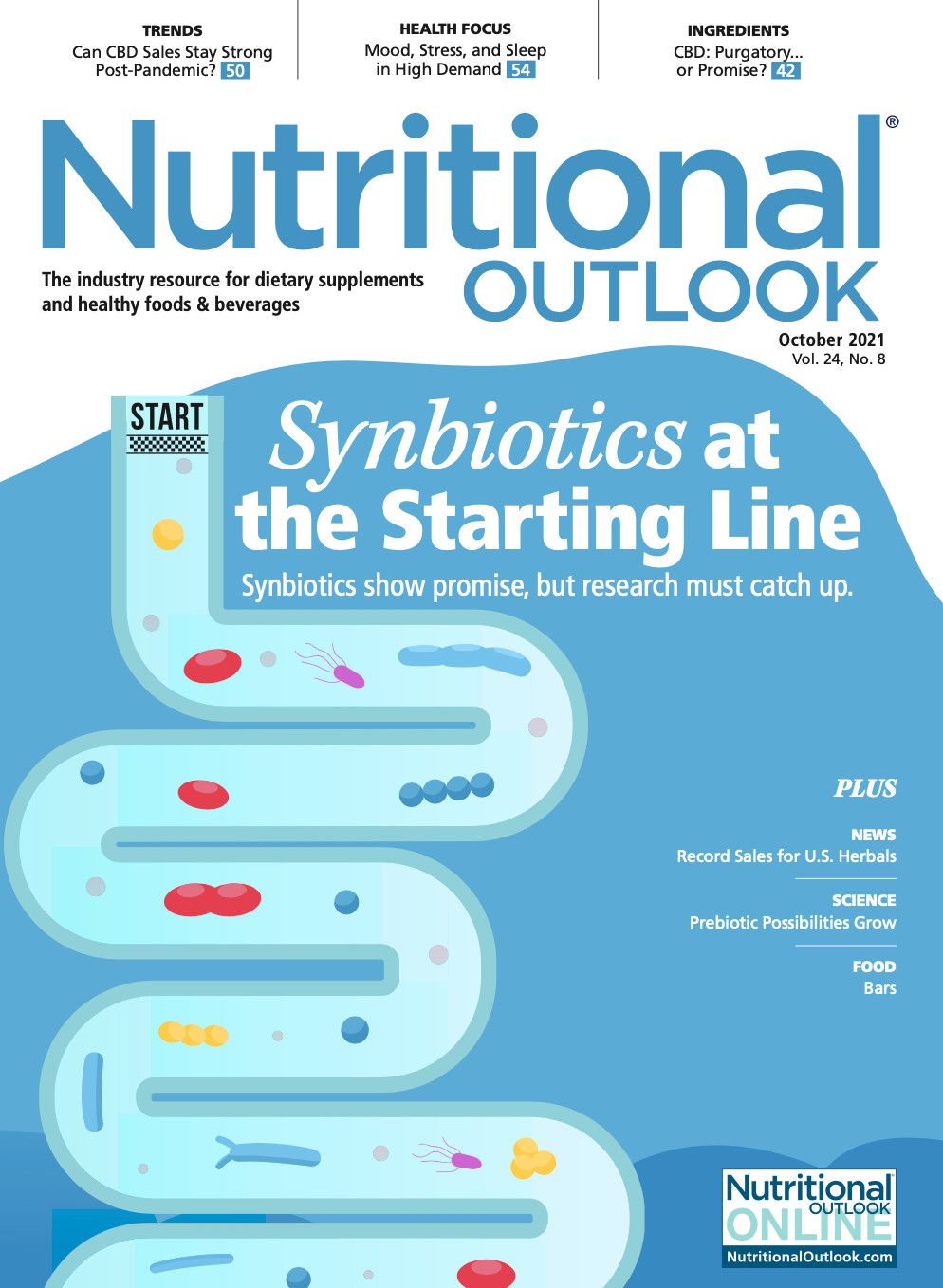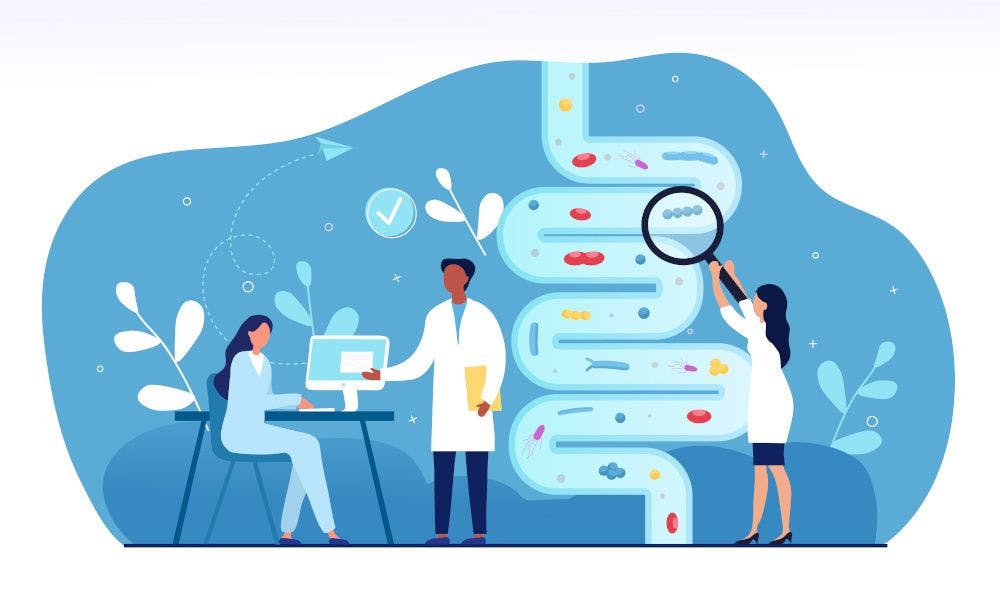More than a feeling: Mood, stress, and sleep supplements are having a moment
The market for mood, stress, and sleep supplements was growing long before COVID-19. The pan-demic shot it into the stratosphere.
Photo© Creativeteam - Stock.adobe.com

Now that our phones are ever at our fingertips, taking quizzes has become less an ordeal than a diverting lark. Drawing a bead on our spirit animal, our love language, or which castaway we’d be if we, too, were stuck on Gilligan’s Island can go a long way toward distracting our attention from the cares of the day.
So when Mental Health America’s 2021 The State of Mental Health in America report1 revealed that from January to September 2020, 315,220 people took the organization’s online screening test for anxiety—a 93% increase over 2019’s total number of screenings—it became harder not to draw a stark conclusion about how Americans have been feeling lately.
Maggie McNamara’s conclusion: “The number of people looking for help has skyrocketed.” And how. “During the pandemic, about four in 10 U.S. adults reported symptoms of anxiety or depressive disorder2,” recounts McNamara, marketing director at Gencor (Austin, TX). “That’s up from one in 10 adults who reported these symptoms from January to June 20193.”
Fortunately, the dietary supplement industry has solutions that address the pandemic’s mental as well as physical fallout. As McNamara says, “Brands are positioning products according to needs such as sleep, mood, focus, and cognition.” And consumers? “They’re on the lookout for supplements that provide additional assurance to those suffering the burdens of stress and anxiety.”
Emotional Collateral Damage
None of this strikes Duffy MacKay, ND, as surprising.
“Consumers were turning to supplements to support sleep and manage stress long before the COVID-19 pandemic hit,” notes the senior vice president of scientific and regulatory affairs for CV Sciences (San Diego, CA), makers of PlusCBD, when interviewed in September. (MacKay has since joined the Consumer Healthcare Products Association.) “And as data demonstrates, they’ve continued to do so throughout these challenging times.”
Stacey Daigle, director of inside/international sales and marketing, NutriScience Innovations LLC (Milford, CT), agrees. “While this wasn’t a new category, it’s one that’s evolved because of the pandemic,” she argues. “And though the initial response was to seek immune-health products, the longer-term, and more sustained, response has been toward products targeting emotional and overall wellbeing.”
A Story of Sales
Indeed, says Lisa C. Buono, principal, healthcare practice, IRI (Chicago), “It’s hard to dismiss that the pandemic has had an impact of epic proportions on CPGs.”
Drawing from IRI’s multioutlet data—essentially brick-and-mortar stores,” she says—Buono did her own back-of-the-envelope analysis, tallying [U.S.] dollar sales for ingredients most associated with sleep, stress, and mood management. The results: Products formulated to address these issues represented total sales of about $2.1 billion in 2020, up 25% versus a year ago.
And the momentum continues into 2021, propelling sleep, stress, and mood-management products toward a total-year estimate of $2.5 billion in sales, up 19% thus far versus last year, by Buono’s reckoning. “More importantly,” she says, “this segment seems to be outpacing the entire vitamins/minerals/supplements (VMS) category, accounting for a substantial chunk of its overall growth.”
Similarly, a survey of SPINS data for condition-specific formulas across U.S. natural-enhanced and conventional channels (powered by IRI) shows 34% growth—amounting to over $870 million in current total sales—for calmative and mood support plus sleep supplements for the 52 weeks ending August 8, 2021.
Not surprisingly, SPINS data also show sales of those same condition-specific formulas up even higher—40% to nearly $652 million—during the pandemic.
Breaking the growth down, calmative and mood-support formulas rose 35% while sleep grew 41%, with total sales for supplements that promote mood support and sleep but that fall outside the condition-specific sector also up 9%.
Escape-Valve Ingredients
Analyzing the data more granularly, Farhana Majid, marketing operations associate at SPINS (Chicago), observes that “many functional ingredients known to promote mood and sleep support have increased rapidly thanks to consumer interest and new product launches.” During the 52 weeks covered, magnesium sales rose 570%, ashwagandha 295%, lemon balm 278%, and L-theanine 277%, per SPINS’ accounting. “And if we look at the highest growth in dollar sales,” Majid adds, “melatonin and ashwagandha are leading the way.”
NutriScience’s Daigle, for one, is bullish on the prospects for L-theanine—particularly, the brand that Taiyo (Minneapolis, MN) markets as Suntheanine. Research in both adults and children supports its stress-reducing, relaxation-promoting, focus-sharpening, and sleep-improving effects, Daigle claims, adding that those effects emerge in as little as 30 to 60 minutes after ingestion. Its high solubility and “nearly neutral” taste suit it to everything from tablets and capsules to chewables, powdered mixes, “and other novel delivery systems,” she says.
With efficiency always top-of-mind, Daigle continues, “a product that collectively addresses concerns like immunity, sleep, and digestive health—all of which stress affects negatively—can reduce the number of supplements to take and make it easier to stay on track with a regimen.” So, combining L-theanine with ashwagandha, for instance, “offers an ideal solution addressing both daytime stress and a good night’s sleep without causing daytime drowsiness.”
Meantime, McNamara calls attention to Gencor’s patented process for extracting key constituents from the Caralluma fimbriata plant without chemically altering them. “This has allowed Gencor to develop a safe, effective, and easy-to-use ingredient that helps adults deal with stress and, ultimately, lower their anxiety levels,” she says.
Not only do studies show that the ingredient promotes a sense of calmness, she says; research4 also indicates that it supports a healthy adrenal response and cortisol levels, “making it a more holistic stress and anxiety solution.” Available as a free-flowing, 90%-water-soluble powder, its stability in high-temperature, acid, and alkaline conditions permits formulation in beverages, smoothies, teas, and even chocolate, not to mention traditional capsules and tablets.
Among the conclusions to emerge from continuing research into the microbiome is the understanding that the inhabitants of our gut influence not only digestion but sleep and stress, too. And prebiotic ingredients, in turn, influence the health and makeup of those inhabitants.
“Several clinical studies have shown that galacto-oligosaccharides, or GOS, can increase the relative abundance of Bifidobacteria in the gut, which correlates with reduced stress and anxiety symptoms,” explains Linda Peek, senior marketing manager, Biotis, at FrieslandCampina Ingredients (Amersfoort, The Netherlands).
FrieslandCampina recently partnered with the University of Surrey to assess the effects of the company’s branded Biotis GOS on anxiety in women and found that the prebiotic lowered participants’ self-reported anxiety levels while improving their ability to process emotional content.5
Another recent study6 examined the effects of FrieslandCampina’s Biotis SleepWell ingredient in adults with moderate sleep disturbances, finding that 14 days of before-bedtime supplementation improved participants’ sleep quality, reduced cortisol levels upon waking, and stimulated intestinal Bifidobacteria populations, “which was associated with a better chance of improving sleep quality,” Peek notes.
The product—which comprises not just prebiotic GOS but the amino acids tryptophan and cysteine as well as vitamins and minerals—is neutral in taste and exhibits heat and acid stability, she adds, “making it easy to formulate into products that consumers want, including functional shots, waters, yogurts, bars, and powder sachets.”
Eva Criado Clemente, communication manager, Pharmactive Biotech Products SL (Madrid, Spain), notes that “natural” solutions are attracting consumers looking to “cope with daily reality, take care of their health, and prevent future problems.” Not surprisingly, then, Pharmactive witnessed double-digit increased demand for its Affron branded saffron extract during the pandemic, she says.
One recent study7 showed that the extract improved mood in menopausal women, while another8 demonstrated that supplementation at low dosage one hour before bedtime enhanced sleep and helped maintain a healthy sleep pattern. “This latter study unlocks a new mechanism of action assessing saffron’s effect on melatonin levels,” Criado Clemente adds, “which is why we’re constantly investing in research and clinical studies to bring about further scientific evidence and understanding about mechanisms of action for this ingredient.”
Everything’s Coming Up Cannabis
The need for natural mood and sleep support has clearly inspired R&D across ingredients. But, says Buono, “When I think of sleep, mood, and stress going forward, I think of the promise of CBD. Of course, we need FDA or the government in general to provide guidelines as to what’s allowed, but helping consumers manage these issues is squarely in CBD’s wheelhouse.”
Just ask the consumers. BDSA (Boulder, CO) data show that 35% of consumers in the states where cannabis is fully legal (Arizona, California, Colorado, Illinois, Massachusetts, Maryland, Nevada, and Oregon) cite “some sort of mental health benefit, like anxiety relief, relaxation, or creativity, as their primary reason for consumption,” observes Kelly Nielsen, BDSA’s vice president of insights and analytics.
“Specifically, the top reasons consumers use inhalable or edible cannabis products are to relax and be mellow, help with sleep, feel peaceful, manage stress and anxiety, and manage pain,” she continues. “So, four of the top five reasons to opt in are about assisting with mood, relaxation, and mental health.”
All of which checks out with CV Sciences’ MacKay. “Here in California, we’ve observed recreational cannabis users taking recreational cannabis products—usually lower in THC and higher in CBD—in addition to other natural ingredients like magnesium and melatonin to achieve sleep and calm without getting stoned,” he says. “This ‘cannabis wellness’ concept is gaining traction as THC loses its stigma and more people recognize its role in the natural-medicine paradigm.”
But it’s the non-psychoactive cannabinoids that attract the most attention. And while CBD is chief among them, “There’s so much more to learn about the sleep benefits of emerging cannabinoids like CBN,” or cannabinol, MacKay says.
Nevertheless, he cautions, “Until we have a fully regulated and science-based market, CBN should be a ‘buyer-beware’ category. Consumers can buy CBN with claims of helping sleep, but this is in the absence of credible scientific evidence showing that it helps with sleep or is even safe to take at the levels found in available products.”
Form and Function
Even so, CBD has broken tremendous ground for cannabis not just in shaping mood-, stress-, and sleep-supplement sales, but in setting delivery-format precedents, too.
“Consumers continue to want gummy products,” MacKay says. So it’s no coincidence, he goes on, that Brightfield Group research shows that 46% of CBD users pursuing sleep, relaxation, and emotional relief turn to gummies.
That said, “Formulating with gummies has technical limits, as not all ingredients, flavors, or chemistries work within the gummy matrix,” he continues. “But if you have an innovative, effective formulation that translates into a great-tasting gummy, it’ll win.” Such has been the case, he claims, with CV Sciences’ PlusCBD Calm and Sleep gummies, formulated with melatonin, magnolia, and lemon bark, which “work synergistically to support the endocannabinoid system and overall health,” he says.
But while gummies are gaining traction, “Consumers want variety,” NutriScience’s Daigle maintains, “and there are opportunities to use other delivery systems to make supplementing more of an experience, whether by mixing a product into a beverage or consuming it in a form that feels like a treat or indulgence.”
Last Best Hope
Further, Buono says, “We’ve learned from our consumer surveys that many prefer managing mood, stress, and sleep without prescription meds—making VMS alternatives a good choice.”
For one, the products’ reputation for safety and effectiveness relative to over-the-counter and prescription solutions is growing. For another, the pandemic deserves credit for bringing mental-health supplements “out of the closet,” Buono says. COVID’s near-universal pressures made it “okay and even mainstream to admit to having anxiety, stress, and worry, and even debilitating cases of them,” she believes.
And that empowerment is here to stay. “During quarantine’s early days, people had time to reflect and make changes to their wellness regimens,” Daigle recalls. “And many of these changes have become sustained practices as people experience the benefits of supplementing to address mood, stress, and sleep.”
“Given the stress of modern life and what we’ve learned from this pandemic,” she wagers, “it’s likely that formulas targeting emotional wellbeing are here to stay and will continue growing—even post-pandemic—as consumers continue making their overall health a priority.”
References
- Mental Health America report. “2021 The State of Mental Health in America.”
- Kaiser Family Foundation report. “Adults Reporting Symptoms of Anxiety or Depressive Disorder During COVID-19 Pandemic.”
- National Center for Health Statistics report, National Health Interview Survey Early Release Program. “Early Release of Selected Mental Health Estimates Based on Data from the January–June 2019 National Health Interview Survey.” Released May 2020.
- Kell G et al. “A randomized placebo controlled clinical trial on the efficacy of Caralluma fimbriata supplement for reducing anxiety and stress in healthy adults over eight weeks.” Journal of Affective Disorders, vol. 246 (March 1, 2019): 619-626
- Johnstone N et al. “Anxiolytic effects of a galacto-oligosaccharides prebiotic in healthy females (18–25 years) with corresponding changes in gut bacterial composition.” Scientific Reports, vol. 11, no. 1 (April 15, 2021): 8302
- Schaafsma A et al. “The effects of a whey-protein and galacto-oligosaccharides based product on parameters of sleep quality, stress, and gut microbiota in apparently healthy adults with moderate sleep disturbances: A randomized controlled cross-over study.” Nutrients, vol. 13, no. 7 (June 27, 2021): 2204
- Lopresti AL et al. “The effects of a saffron extract (affron®) on menopausal symptoms in women during perimenopause: A randomised, double-blind, placebo-controlled study.” Journal of Menopausal Medicine, vol. 27, no. 2 (August 2021): 66-78
- Lopresti AL et al. “Effects of saffron on sleep quality in healthy adults with self-reported poor sleep: A randomized, double-blind, placebo-controlled trial.” Journal of Clinical Sleep Medicine, vol. 16, no. 6 (June 15, 2020): 937-947

Prinova acquires Aplinova to further increase its footprint in Latin America
April 7th 2025Prinova has recently announced the acquisition of Brazilian ingredients distributor Aplinova, which is a provider of specialty ingredients for a range of market segments that include food, beverage, supplements, and personal care.

























